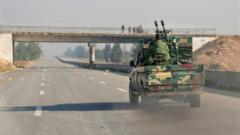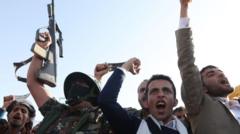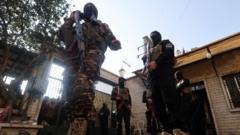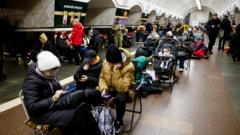The recent offensive by rebel groups in Syria marks a significant turn in the ongoing conflict, challenging the Assad regime's grip on power. The situation reflects a complex interplay of international relationships and the evolution of rebel forces, as calls for political resolution intensify amid growing violence.
The Resurgence of Syrian Rebels: Implications for Assad's Regime

The Resurgence of Syrian Rebels: Implications for Assad's Regime
As rebel forces launch a surprising offensive in Syria, questions arise about the stability of Bashar al-Assad's regime amidst changing dynamics in the region.
The reignited conflict in Syria has resurfaced with heightened intensity, following the destabilizing effects of the Hamas attacks on Israel on October 7, 2022. Rather than subsiding, the situation in Syria showcases the broader turmoil across the Middle East, as the landscape shifts rapidly.
Bashar al-Assad's regime, which survived a decade of war since 2011 by relying on key allies like Russia, Iran, and Hezbollah, now faces mounting challenges. Iran has recently suffered significant attacks from Israel, crippling its military ally Hezbollah, which once played a pivotal role in supporting Assad's forces. Meanwhile, Russia's focus has turned predominantly to its engagement in Ukraine, limiting its military capacity to assist the Assad regime effectively.
This resurgence of conflict, previously overshadowed by other regional crises, has flared back into the headlines, albeit with relatively restricted media coverage due to access challenges. Areas previously deemed stable are now characterized by unfinished political and social grievances.
The current offensive has been spearheaded by Hayat Tahrir al-Sham (HTS), a coalition of rebel factions that broke loose from Idlib province, launching an ambitious assault on Syrian government positions. Remarkably, HTS has achieved rapid territorial gains, even capturing the historical citadel of Aleppo, a significant stronghold that had been under government control for years. The images emerging from Aleppo depict a city seemingly at ease, albeit still under the shadow of ongoing clashes.
HTS, though designated as a terrorist organization by several states, has attempted to distance itself from its jihadist roots, instead framing its latest operations under the guise of a united rebel front. This rebranding aims to garner broader support within Syria, where many citizens remain wary of extremist narratives.
The complex geography of northern Syria complicates the conflict further. Various factions control disparate regions, with Kurdish-led Syrian Democratic Forces backed by the US dominating the northeast, while Turkey holds substantial influence over border areas where it has deployed troops and affiliates. Reports indicate that the rebel factions are now seizing substantial military resources, boosting their operational capacity.
As the conflict escalates, international concerns mount regarding the impact on regional stability. The UN's envoy to Syria highlighted risks to civilians and emphasized the need for a genuine political process, calling attention to the collective failures in addressing the crisis. Past diplomatic efforts, particularly UN Security Council resolution 2254, intended to pave the way for a peaceful settlement, have yet to materialize in any significant manner, further complicating the landscape.
Despite the recent successes of the rebels, it would be premature to declare the Assad regime finished. Some segments of the Syrian population still view the regime as the lesser of two evils, compared to the extremism that plagued the early years of the conflict. The fragility of alliances on both sides, the potential for new anti-Assad groups to emerge, and the ongoing geopolitical implications underscore that Assad's hold on Syria remains tenuous, but intact for the moment.
Bashar al-Assad's regime, which survived a decade of war since 2011 by relying on key allies like Russia, Iran, and Hezbollah, now faces mounting challenges. Iran has recently suffered significant attacks from Israel, crippling its military ally Hezbollah, which once played a pivotal role in supporting Assad's forces. Meanwhile, Russia's focus has turned predominantly to its engagement in Ukraine, limiting its military capacity to assist the Assad regime effectively.
This resurgence of conflict, previously overshadowed by other regional crises, has flared back into the headlines, albeit with relatively restricted media coverage due to access challenges. Areas previously deemed stable are now characterized by unfinished political and social grievances.
The current offensive has been spearheaded by Hayat Tahrir al-Sham (HTS), a coalition of rebel factions that broke loose from Idlib province, launching an ambitious assault on Syrian government positions. Remarkably, HTS has achieved rapid territorial gains, even capturing the historical citadel of Aleppo, a significant stronghold that had been under government control for years. The images emerging from Aleppo depict a city seemingly at ease, albeit still under the shadow of ongoing clashes.
HTS, though designated as a terrorist organization by several states, has attempted to distance itself from its jihadist roots, instead framing its latest operations under the guise of a united rebel front. This rebranding aims to garner broader support within Syria, where many citizens remain wary of extremist narratives.
The complex geography of northern Syria complicates the conflict further. Various factions control disparate regions, with Kurdish-led Syrian Democratic Forces backed by the US dominating the northeast, while Turkey holds substantial influence over border areas where it has deployed troops and affiliates. Reports indicate that the rebel factions are now seizing substantial military resources, boosting their operational capacity.
As the conflict escalates, international concerns mount regarding the impact on regional stability. The UN's envoy to Syria highlighted risks to civilians and emphasized the need for a genuine political process, calling attention to the collective failures in addressing the crisis. Past diplomatic efforts, particularly UN Security Council resolution 2254, intended to pave the way for a peaceful settlement, have yet to materialize in any significant manner, further complicating the landscape.
Despite the recent successes of the rebels, it would be premature to declare the Assad regime finished. Some segments of the Syrian population still view the regime as the lesser of two evils, compared to the extremism that plagued the early years of the conflict. The fragility of alliances on both sides, the potential for new anti-Assad groups to emerge, and the ongoing geopolitical implications underscore that Assad's hold on Syria remains tenuous, but intact for the moment.






















